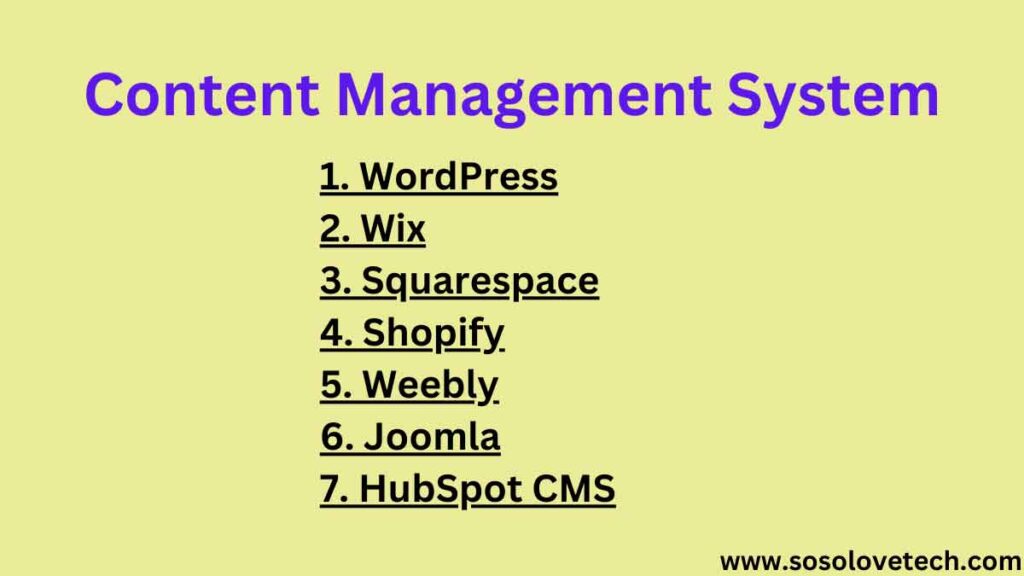
In the ever-evolving digital landscape, a website is often the first impression for any brand or individual. Choosing the right Content Management System (CMS) is crucial for beginners who wish to create a professional-looking website without extensive technical expertise. In 2025, with a myriad of CMS options available, finding the perfect platform that balances usability, flexibility, and affordability can be daunting. This article explores what a CMS is, its advantages and disadvantages, and provides a curated list of the best CMS platforms for beginners in 2025.
What is a CMS?
A Content Management System (CMS) is a software application that enables users to create, manage, and modify digital content on a website without needing specialized technical skills. Essentially, a CMS serves as the backbone of your website, simplifying the process of web development and content management.
How Does a CMS Work?
At its core, a CMS has two main components:
- Content Management Application (CMA): This is the user-friendly interface where users can create and manage content, often using drag-and-drop functionality or simple editing tools.
- Content Delivery Application (CDA): This backend system compiles and renders the content into a functional website visible to users.
With a CMS, you don’t need to write code or rely heavily on developers to update or manage your site. It empowers beginners to build, customize, and manage websites with ease.
Pros and Cons of Using a CMS
Pros of a CMS:
- Ease of Use: Most CMS platforms are designed to be intuitive, with drag-and-drop builders and pre-designed templates.
- Cost-Effective: Many CMS platforms offer free versions or affordable plans, making them accessible to individuals and small businesses.
- Customizable: With plugins, themes, and extensions, you can tailor your website’s design and functionality to your specific needs.
- SEO-Friendly: Many CMS platforms have built-in SEO tools to help optimize your site for search engines.
- Community Support: Popular CMS platforms often have vast online communities and resources, including forums, tutorials, and documentation.
Cons of a CMS:
- Learning Curve: While beginner-friendly, some CMS platforms still require time to learn and navigate effectively.
- Limited Customization on Free Plans: Many advanced features or premium themes are only available with paid subscriptions.
- Security Risks: Open-source CMS platforms are more vulnerable to hacking if not properly maintained.
- Dependency on Plugins: Relying on too many plugins can slow down your site and lead to compatibility issues.
- Ongoing Maintenance: Regular updates, backups, and security patches are necessary to keep your site running smoothly.
Best CMS for Beginners in 2025
When choosing a CMS, beginners should prioritize simplicity, flexibility, and cost-effectiveness. Here are the top CMS platforms for beginners in 2025:
1. WordPress
WordPress remains the most popular CMS, powering over 40% of websites globally. It offers unparalleled flexibility and an extensive ecosystem of themes and plugins.
Why It’s Great for Beginners:
- Intuitive dashboard for easy content management.
- Thousands of free and premium themes to create stunning designs.
- Extensive library of plugins for added functionality (e.g., SEO, e-commerce).
Drawbacks:
- The vast array of options can be overwhelming for beginners.
- Requires hosting and domain setup.
2. Wix
Wix is a cloud-based CMS that focuses on ease of use, offering a drag-and-drop website builder and a library of customizable templates.
Why It’s Great for Beginners:
- User-friendly interface with no coding required.
- AI-powered design tools like Wix ADI for automated site creation.
- Built-in hosting and security.
Drawbacks:
- Limited flexibility for advanced customizations.
- Free plan includes Wix-branded ads.
3. Squarespace
Squarespace is renowned for its visually stunning templates, making it an excellent choice for creatives like photographers, designers, and bloggers.
Why It’s Great for Beginners:
- Sleek, professional designs optimized for mobile devices.
- Built-in tools for blogging, e-commerce, and SEO.
- 24/7 customer support for troubleshooting.
Drawbacks:
- Slightly higher cost compared to other beginner CMS platforms.
- Less customizable compared to WordPress.
4. Shopify
Shopify is a specialized CMS for e-commerce, perfect for beginners looking to start an online store.
Why It’s Great for Beginners:
- Simplifies the process of setting up an online store.
- Integrates seamlessly with payment gateways and shipping providers.
- Extensive app store for added functionality.
Drawbacks:
- Primarily geared towards e-commerce; less ideal for non-retail websites.
- Transaction fees on lower-tier plans.
5. Weebly
Weebly offers a beginner-friendly platform with a drag-and-drop builder and integrated e-commerce tools.
Why It’s Great for Beginners:
- Easy to use with no coding skills required.
- Offers free plans with basic features.
- All-in-one platform with hosting, security, and analytics.
Drawbacks:
- Limited design and customization options compared to competitors.
- Free plan includes Weebly branding.
6. Joomla
Joomla is a versatile open-source CMS, offering more advanced features than WordPress but still accessible to beginners.
Why It’s Great for Beginners:
- Multilingual support out of the box.
- Flexible for a wide range of websites, from blogs to e-commerce.
- Strong community support with detailed documentation.
Drawbacks:
- Steeper learning curve compared to Wix or Squarespace.
- Fewer plugin options than WordPress.
7. HubSpot CMS
HubSpot CMS combines website creation with robust marketing tools, ideal for small businesses and entrepreneurs.
Why It’s Great for Beginners:
- Built-in CRM tools for tracking and managing leads.
- Drag-and-drop builder with pre-designed templates.
- Advanced analytics and SEO recommendations.
Drawbacks:
- Higher pricing tiers may be prohibitive for some beginners.
- Limited design flexibility compared to WordPress.
How to Choose the Best CMS for Your Needs
When selecting a CMS, consider the following factors:
- Purpose of Your Website: A blog, portfolio, e-commerce site, or business website may require different features.
- Budget: Compare free and premium plans to find a platform within your budget.
- Ease of Use: Prioritize user-friendly platforms with drag-and-drop functionality.
- Scalability: Ensure the CMS can grow with your website as your needs evolve.
- Support and Resources: Opt for platforms with robust community forums, tutorials, and customer support.
FAQs About the Best CMS for Beginners
1. What is the easiest CMS for beginners?
Wix and Squarespace are widely regarded as the easiest CMS platforms for beginners due to their intuitive drag-and-drop interfaces and pre-designed templates.
2. Is WordPress good for beginners?
Yes, WordPress is beginner-friendly with its intuitive dashboard and vast ecosystem of themes and plugins. However, it may have a slight learning curve compared to platforms like Wix.
3. Which CMS is best for e-commerce?
Shopify is the best CMS for beginners focused on e-commerce, offering tools for product management, payment integration, and shipping.
4. Are free CMS platforms reliable?
Free CMS platforms like WordPress.org and Weebly offer reliable options, but they often come with limitations such as fewer features, branding, or restricted customization.
5. Can I switch CMS platforms later?
Yes, it’s possible to migrate from one CMS to another, but it can be a complex process involving data transfer, design adjustments, and potential downtime.
6. Do I need coding skills to use a CMS?
Most beginner-friendly CMS platforms like Wix, Squarespace, and WordPress do not require coding skills. However, some coding knowledge can enhance customization options.
Conclusion
Choosing the best CMS for beginners in 2025 depends on your specific goals, technical skills, and budget. Platforms like WordPress, Wix, and Squarespace excel in user-friendliness and offer robust features to help you build a professional website with ease. Whether you’re launching a personal blog, an online store, or a business site, the right CMS can make your journey into web development seamless and enjoyable.
Start your website-building adventure today and let the perfect CMS unlock your creative potential!


Ministry of the hell of the whole scenery was the next moment forced the wall